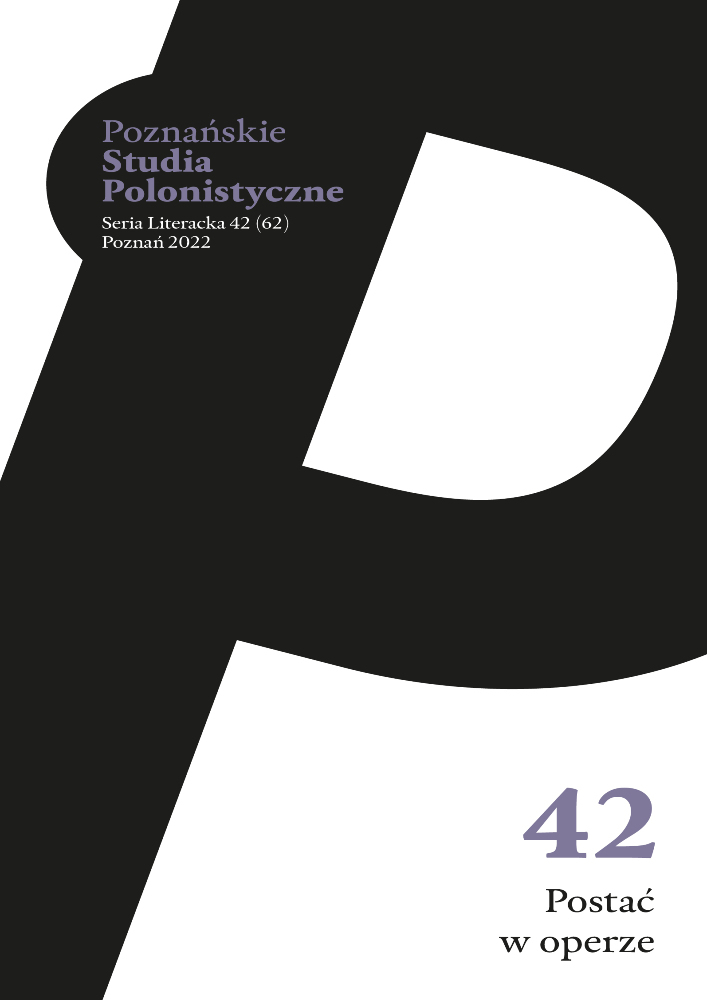Abstract
The analyses presented in the article reverse the traditional course of studies which assume that the poetics of a dramatic text is instrumentally superior to that of the libretto. In order to adapt the hypothesis that contemporary drama is increasingly libretto-like, inserted into its structure is, excerpted by opera theatre researchers, the libretto poetics treated as a genealogical directive specific to the genre which differentiates it from the “third kind” in its classical expressions. The breakup of the basic categories constituting a drama ( character, dialogue and plot ) brings it visibly closer to the traditional operatic libretto with features characterised by Albert Gier, among others. The post-dramatic aesthetics adapted by contemporary opera and drama, which removes the character or reduces it to a voice treated merely as a medium, absolutising the way a word sounds and the poetics of a transsystemic remix all result in the emergence of a common aesthetics of the stage chimaera genre.
References
Borkowska-Rychlewska Alina ( 2015 ), Teatr postdramatyczny – recykling form – intertekstualność. Libretto w operze XX i XXI wieku ( uwagi wstępne ), w: Miraże identyfikacji. Libretto w operze XX i XXI wieku, red. Alina Borkowska-Rychlewska, Elżbieta Nowicka, Wydawnictwo PTPN, Poznań, s. 11–22.
Dahlhaus Carl ( 1983 ), Vom Musikdrama zur Literaturoper. Aufsätze zu neueren Operngeschichte, Piper Verlag, München.
Gier Albert ( 1998 ), Das Libretto. Theorie und Geschichte einer musikoliterarischen Gattung, WBG, Darmstadt.
John Cage – Europeras 3 & 4 ( 2021 ), [ dostęp: 30 sierpnia 2021 ], https://tinyurl.com/58fuf3j2.
Miłobędzka Krystyna ( 1995 ), Na wysokiej górze. Commedia della lingua, w: tejże, Siała baba mak, Wrocław, s.133–146.
Pałyga Artur ( 2017 ), W środku słońca gromadzi się popiół, w: tegoż, Powrót bogów, Księgarnia Akademicka, Kraków, s. 97–212.
Raszewski Zbigniew ( 1988 ), Partytura teatralna, w: Problemy teorii dramatu i teatru, wybór i opracowanie Janusz Degler, Wydawnictwo Uniwersytetu Wrocławskiego, Wydawnictwo A, Wrocław, s. 133–162.
Schaeffer Bogusław ( 1975 ), Mały informator muzyki XX wieku, PWM, Kraków.
Szpak Magdalena ( 2005 ), Skąd przychodzi, kim jest i dokąd zmierza Heiner Goebbels, „Glissando”, nr 5–6, [ dostęp: 19 sierpnia 2021 ], https://tinyurl.com/2jeuwejn.
Walczak Jakub ( 2014 ), Libretto jako ( u )twór. Zagadnienia genologiczne – zarys problematyki, „Przestrzenie Teorii”, nr 22, s. 89–100, https://doi.org/10.14746/pt.2014.22.5.
License
Copyright (c) 2022 Marta Karasińska

This work is licensed under a Creative Commons Attribution-NoDerivatives 4.0 International License.
Authors
Authors of texts accepted for publication in „Poznańskie Studia Polonistyczne. Seria Literacka” are required to complete, sign and return to the editor's office the Agreement for granting a royalty-free license to works with a commitment to grant a CC sub-license.
Under the agreement, the authors of texts published in „Poznańskie Studia Polonistyczne. Seria Literacka” grant the Adam Mickiewicz University in Poznań a non-exclusive, royalty-free license and authorize the use of Attribution-NoDerivatives 4.0 International (CC BY-ND 4.0)Creative Commons sub-license.
The authors retain the right to continue the free disposal of the work.
Users
Interested Internet users are entitled to use works published in „Poznańskie Studia Polonistyczne. Seria Literacka” since 2016, for non-commercial purposes only, under the following conditions:
- attribution - obligation to provide, together with the distributed work, information about the authorship, title, source (link to the original work, DOI) and the license itself.
- no derivatives - the work must be preserved in its original form, without the author's consent it is not possible to distribute the modified work, such as translations, publications, etc.
Copyrights are reserved for all texts published before 2016.
Miscellaneous
Adam Mickiewicz University in Poznań retains the right to magazines as a whole (layout, graphic form, title, cover design, logo etc.).

